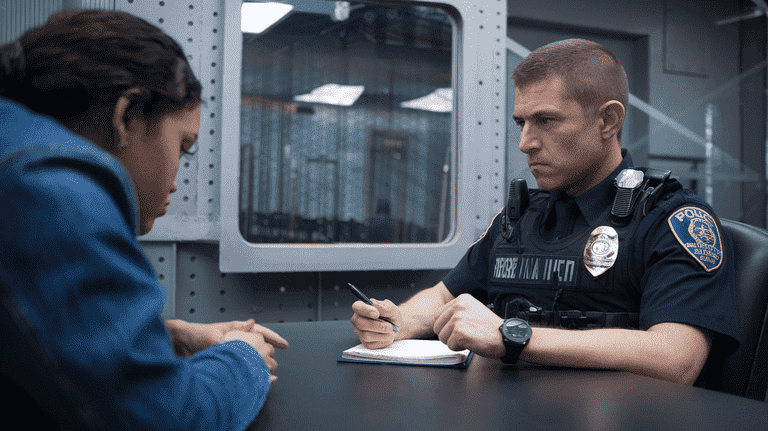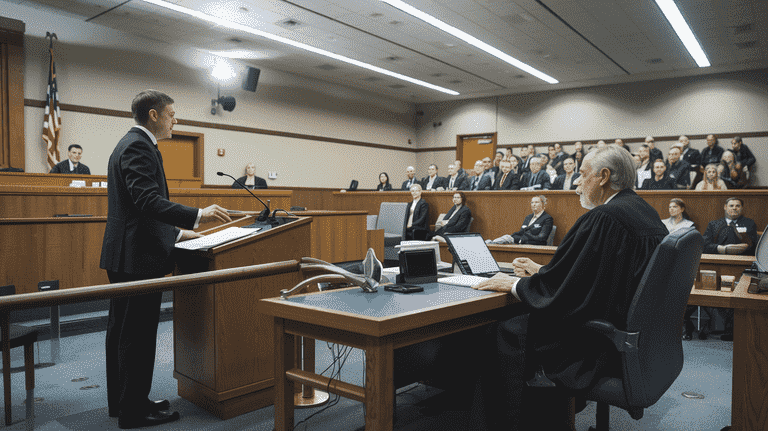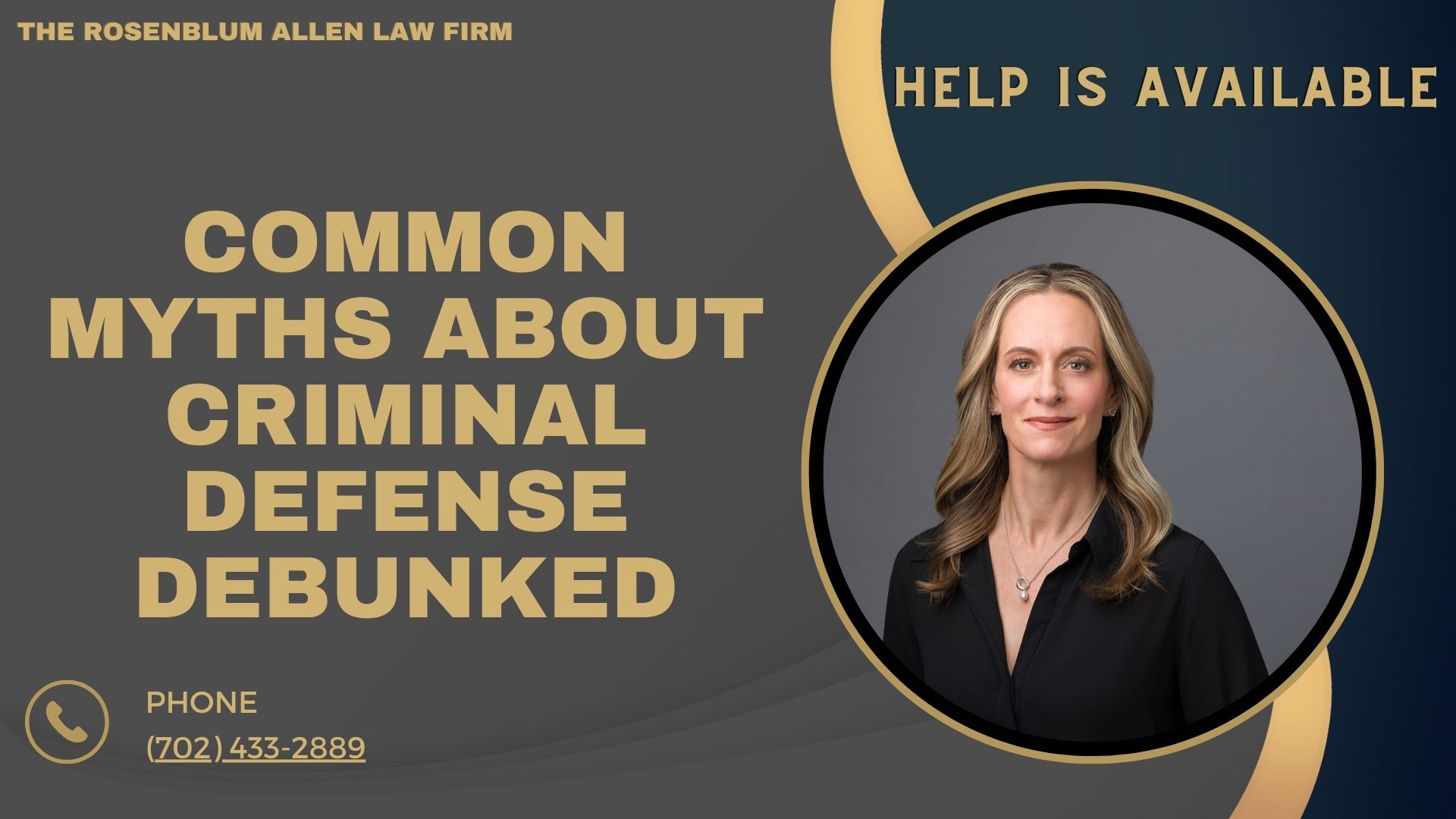Misconceptions often surround criminal defense. You might know the system from TV shows, movies, or word of mouth. However, believing these myths can lead to misunderstandings and jeopardize your rights. This guide breaks down the common myths about criminal defense to help you get the facts straight.
Note: Make sure to also check out our Understanding Common Legal Defenses and Criminal Defense FAQs for Nevadans posts while you’re here.
Myth: If You’re Innocent, You Don’t Need a Lawyer
It’s a common belief that innocent people don’t need legal help. After all, if you did nothing wrong, why hire a lawyer? Unfortunately, this myth overlooks how the legal system works.
The Reality of the Legal System
Innocent people can still face charges due to misunderstandings, mistaken identity, or false accusations. Being innocent does not guarantee that the system will work in your favor automatically.
How Lawyers Protect Your Rights
- Prevent Coercion: Lawyers shield you from aggressive police tactics during questioning.
- Navigate Legal Procedures: A lawyer ensures that every legal step is followed correctly.
- Challenge Faulty Evidence: Attorneys can identify and fight against misleading, incorrect, or unlawfully obtained evidence.
Examples of Wrongful Convictions
Even innocent people can be wrongfully convicted due to:
- Eyewitness Misidentification: Well-meaning witnesses can make mistakes.
- False Confessions: High-pressure interrogations can lead to false admissions.
- Invalid Forensic Evidence: Misinterpreted or unreliable forensic evidence has led to wrongful convictions.
Myth: All Defense Attorneys Are the Same
It’s easy to think that any defense attorney will do, but not all attorneys are created equal. Their experience, specialization, and approach can significantly affect your case outcome.
Differences Between Public Defenders and Private Attorneys
- Public Defenders: Often experienced but overworked with many cases.
- Private Attorneys: Manage fewer cases, allowing for more personalized attention and strategy.
How Specialization Impacts Outcomes
An attorney who specializes in cases like yours can be a game-changer. They understand specific legal nuances, know the judges, and are familiar with the prosecution’s typical approaches.
Choosing the Right Attorney
- Ask About Experience: Find out their track record with cases like yours.
- Look for Client Reviews: See what past clients say about their experience.
- Comfort Level: Choose an attorney you feel comfortable with and confident in.

Myth: The Police Must Tell You the Truth
Many believe that police officers must always be truthful during interrogations. However, police are legally allowed to use deceptive tactics to obtain confessions.
Misconceptions About Police Interrogation Tactics
While some officers aim to gather facts ethically, some tactics are specifically designed to confuse or pressure suspects into confessing.
Legality of Deceptive Practices
- False Claims: Police can lie about having evidence that doesn’t exist.
- Exaggerating Consequences: Officers may exaggerate the penalties to force cooperation.
- Minimization Techniques: Downplaying the severity of a crime to elicit a confession.
Knowing Your Rights
- Right to Remain Silent: You are not obligated to answer questions without an attorney.
- Right to Legal Representation: Request an attorney immediately to protect your rights.
- Recording Interrogations: Request that interrogations be recorded for accountability.
Myth: Criminal Cases Always Go to Trial
Contrary to popular belief, most criminal cases are not in a courtroom battle. Instead, they are often resolved through plea deals.
The Prevalence of Plea Bargains
Plea bargains are standard because they save time and resources. They help keep the courts from becoming overloaded and can benefit both sides.
How Plea Deals Can Benefit Defendants
- Reduced Charges: A felony may be reduced to a misdemeanor.
- Avoiding Jail Time: Plea deals can offer alternatives like probation or community service.
- Less Stressful Resolution: Plea deals provide a quicker, more predictable outcome.
The Role of a Defense Attorney in Negotiating Plea Agreements
Your attorney plays a crucial role in securing a favorable plea deal. They evaluate the evidence, negotiate terms, and advise on the risks of going to trial.
Myth: You Must Testify in Your Defense
Many believe that defendants must take the stand to prove their innocence, but this is not true and is often not advisable.
Reasons Why Defendants Often Do Not Testify
- Cross-Examination Risks: Prosecutors can twist your words.
- Nervousness or Anxiety: Being on the stand can be intimidating and lead to mistakes.
- No Obligation to Prove Innocence: The burden is on the prosecution to prove guilt.
The Right to Remain Silent and Its Impact
- Juries Cannot Hold It Against You: Silence cannot be used to indicate guilt.
- Avoids Self-Incrimination: Staying silent prevents you from accidentally saying something harmful.
How Defense Strategies Don’t Always Require Testimony
Defense attorneys can build a strong case using evidence, cross-examination, and other strategies that do not involve testifying.

Myth: A Good Lawyer Can Get You Off No Matter What
It’s easy to think that a skilled lawyer can win any case, but this needs to be clarified. Lawyers work within the limits of the law, and the evidence plays a critical role.
Realistic Expectations of What a Defense Attorney Can Achieve
Attorneys can challenge evidence, protect your rights, and negotiate deals but cannot guarantee a specific outcome.
The Role of Evidence, Facts, and the Law
Substantial evidence can be hard to overcome; even the best defense strategy has limits.
Examples of How Strong Defense Doesn’t Guarantee Acquittal
- Clear Surveillance Footage: Video evidence is hard to dispute.
- Confessions: Even if recanted, confessions can be influential.
- Multiple Witnesses: Consistent testimony from credible witnesses can seal a case.
Myth: Public Defenders Are Not as Good as Private Attorneys
Some people think public defenders are less competent than private attorneys, but this isn’t necessarily true. Public defenders often have extensive courtroom experience.
The Reality of Public Defenders’ Experience and Caseloads
- Extensive Experience: Public defenders handle numerous cases and know the ins and outs of the criminal justice system.
- High Caseloads: They often manage many cases, impacting the level of individual attention they can provide.
How to Make the Most of a Public Defender
- Be Open and Honest: Full disclosure helps them defend you better.
- Communicate Clearly: Keep in touch and ask questions about your case.
- Stay Involved: Participate actively in your defense.

Breaking It All Down
Myths about criminal defense can mislead and misinform. Understanding the realities of the legal system helps you make better decisions when facing charges. Whether knowing the truth about plea deals, your right to remain silent, or your attorney’s role, being informed is your best defense. Always consult with a knowledgeable lawyer who can guide you through the complexities of your case and ensure your rights are protected every step of the way.

Frequently Asked Questions
Can I change my public defender if I'm unhappy with their representation?
Yes, but it can be challenging. You’ll need to demonstrate that there’s a significant problem with your current representation, such as a conflict of interest or a failure to communicate. Simply not liking your public defender is usually not enough for a change.
What should I do if the police want to question me?
You have the right to remain silent and request an attorney. Politely only answer questions once your lawyer is present. This protects you from inadvertently saying something that could be used against you.
How does a plea bargain work, and should I take one?
A plea bargain involves pleading guilty to a lesser charge or agreeing to a reduced sentence. It’s negotiated between your attorney and the prosecutor. Whether to accept a plea deal depends on the specifics of your case, the evidence against you, and your attorney’s advice.
Is it true that I can't be prosecuted if the police don’t read my rights?
Not exactly. If the police fail to read your Miranda rights, statements you make during questioning may be inadmissible in court. However, it doesn’t automatically mean your case will be dismissed; the prosecution can still use other evidence against you.
Can charges be dropped before going to trial?
Yes, charges can be dropped for various reasons, including lack of evidence, procedural errors, or successful motions filed by your attorney. Your lawyer will work to identify any weaknesses in the prosecution’s case that could lead to a dismissal.
Will my case be public if it goes to court?
Yes, most criminal court proceedings are public. This includes trials, hearings, and records. However, specific details may be kept private, especially in cases involving minors or sensitive information.
What happens if I miss a court date?
Missing a court date can have serious consequences, including the issuance of a bench warrant for your arrest. It’s essential to communicate with your attorney immediately if you cannot attend, as they may be able to reschedule or explain your absence to the court.
Can I speak directly to the prosecutor to explain my story?
It’s strongly advised that you do not speak directly to the prosecutor without your attorney present. Anything you say can be used against you, and your attorney is best equipped to communicate on your behalf and negotiate favorable terms.
How long does the criminal defense process usually take?
The length of the process varies widely based on factors like the complexity of the case, court schedules, and whether a plea bargain is reached. Some cases are resolved in weeks, while others may take months or years.

Additional Resources for You from The Rosenblum Allen Law Firm.
In addition to helping with appeals, our lead attorney, Molly Rosenblum Allen, Esq., has created various resources to support you in other legal matters:
Criminal Defense Attorneys: Effective defense for a wide range of criminal charges to protect your rights and future.
Las Vegas DUI Lawyer: Specialized guidance and defense strategies for those facing DUI charges in Las Vegas.
Domestic Violence Lawyer Las Vegas: Compassionate and experienced legal support for domestic violence cases, focusing on protecting your rights.
Drug Possession Lawyer: Aggressive defense for drug possession charges to minimize the impact on your life.
Sex Crimes Attorney: Dedicated representation for sensitive and serious sex crime allegations.
CPS Defense Attorney: Defense against Child Protective Services actions, protecting your family and parental rights.
Misdemeanor Lawyer: Guidance through the legal process for misdemeanors, aiming for the best possible outcomes.
Las Vegas Warrant Defense Attorney: Help with clearing warrants and addressing related legal issues promptly and efficiently.
Las Vegas Probation Violation Attorney: Skilled defense for probation violations to help you avoid harsh penalties.
Theft Crime Defense Lawyer: Representation for theft charges, focusing on reducing charges or dismissing your case.
Kidnapping Lawyers: Effective legal defense for kidnapping charges, prioritizing your rights and freedom.
Juvenile Defense Lawyers: Protecting the rights of minors facing legal challenges, aiming for solutions that support their future.
Firearms Lawyer Las Vegas: Defense for firearm-related charges, ensuring your second amendment rights are upheld.
These resources are designed to provide you with the knowledge and support needed to navigate these challenging legal issues.

Offsite Resources for You
American Bar Association (ABA): https://www.americanbar.org/
The ABA provides extensive resources and information on the legal process, including articles and guides on appeals and other legal topics.
National Association of Criminal Defense Lawyers (NACDL): https://www.nacdl.org/
NACDL offers resources and advocacy for criminal defense attorneys and individuals facing criminal charges, including insights on appeals.
Nevada Judiciary: https://nvcourts.gov/
The official website of the Nevada Judiciary provides direct access to court information, forms, and procedures for appeals and other legal processes.
FindLaw: https://www.findlaw.com/
FindLaw offers a comprehensive collection of legal articles, case law, and guides on various legal topics, including the appeals process.
Justia: https://www.justia.com/
Justia provides free access to a wide range of legal information, including resources related to appeals and Nevada-specific legal issues.
Martindale-Hubbell: https://www.martindale.com/
Martindale-Hubbell offers lawyer directories and legal articles, helping individuals connect with qualified attorneys and learn more about the appeals process.
National Center for State Courts (NCSC): https://www.ncsc.org/
NCSC provides information on court systems, including appeals processes, court administration, and resources for those involved in legal proceedings.

A Special Message from Our Lead Attorney, Molly Rosenblum Allen, Esq

Thank you for taking the time to read through our resources. Navigating legal challenges, especially when you’re far from home, can be overwhelming, but you don’t have to go through it alone. If you need help with your situation or have any questions, please don’t hesitate to reach out. Give me and my team a call at (702) 433-2889, and let’s get the ball rolling. We’re here to support you every step of the way.
Looking forward to speaking with you soon!






